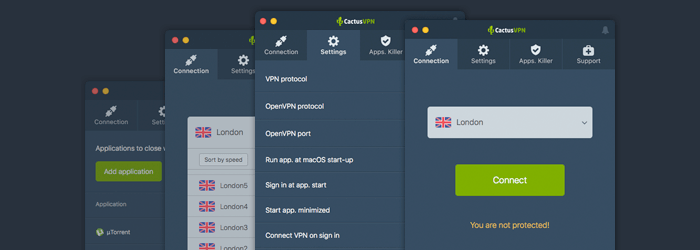What Are the Benefits of Using a Proxy Server?

Ever wondered if there are any worthwhile benefits to using proxy servers?
Well, as a matter of fact, there are a few decent advantages (but also drawbacks) you as an online user should consider when deciding whether or not to use such a service.
Table of contents
But before we start discussing the benefits of a proxy server, you might want to learn what a proxy actually is and how it works. It will help you better understand the proxy server advantages too – among other things.
In case you’re already familiar with this kind of info, feel free to just skip ahead to the “4 Benefits of Using Proxy Servers” section.
What Is a Proxy Server?
A proxy server (usually known as a “proxy” or “application-level gateway”) is a server (either a computer or an application) that acts a gateway between a local network and a large-scale network.
An example of that would be a server acting as an intermediary between your computer and the Internet.
Proxy servers can usually be categorized as being:
- Forward – The standard proxy category, Forward proxies are the intermediary between a computer and a wider network.
- Reverse – Reverse proxies are intermediaries between the web and a smaller group of servers. For instance, a Reverse proxy could act as a gateway between the Internet and a corporate LAN network.
- Open – Open proxies (also called “public proxies”) can be accessed by any online user. They are usually offered to the public free of charge.
How Does a Proxy Server Work?
Basically, a proxy server will act as an intermediary between a client and the server from which the client is requesting a certain service. It will take the client’s request, and perform it on their behalf.
Here’s a basic example: Say you want to use a proxy server to access a certain web page. The proxy will receive your request, and will do one of the following things:
- It will analyze its local cache to see if it can find that particular web page. If it finds it, it will return it to you without having to forward your request to the Internet.
- If the proxy doesn’t locate the web page in its local cache, will request that web page from the web. However, it will not use your IP to do it. Instead, the proxy will act as the client on your behalf, and use one of its own IP addresses. Once it gets the page, it will relate it to your original request, and forward the page back to you.

Of course, you as a user won’t really be aware of that process. To you, it will just seem like you are directly accessing a web page like normal.
What Types of Proxy Servers Are There?
Overall, these are the most common types of proxy servers you’re likely to encounter:
HTTP Proxy Servers
These proxy servers can interpret network traffic, so they are used to cache web pages and files, making it easier and faster for users to access them.
HTTP proxies can affect multiple connections at the same time without their speeds taking a serious hit. All that speed does come at a cost, though – namely a complete lack of encryption.
SSL Proxy Servers
Also known as HTTPS proxies, these proxies provide SSL (Secure Socket Layer) support for the connection between the sender and the receiver in order to secure it.
SSL proxies are less likely to get blocked by your ISP, as they use TCP port 443. If your ISP were to block that port, it’d mean they’d also block your ability to engage in online shopping or banking.
SOCKS Proxy Servers
Unlike an HTTP proxy, a SOCKS proxy doesn’t really bother with interpreting web traffic – it just passes it along.
SOCKS proxies are quite versatile since they can handle multiple types of traffic, like emails (SMTP and POP3), FTP (File Transfer Protocol – used for uploading files to servers), IRC (Internet Relay Chat), and even torrent traffic.
However, due to their popularity, SOCKS proxies tend to be a bit slower, as they are usually overcrowded. Still, they do provide some security, as they offer HTTPS support.
Web Proxies
Web proxies can normally be used inside your browser. They don’t require you to install any additional software. Connections can be either HTTP or HTTPS, so the level of security can vary.
One issue with web proxies is that they have trouble dealing with Java, JavaScript, and Flash scripts, and that they aren’t really able to properly display complex website layouts.
Transparent Proxies
These proxies don’t require any configuration on your part, but they mostly have basic uses – at least from the perspective of an online user.
Still, it’s worth mentioning them because it’s a good idea to understand how they can affect you. While Transparent proxies can be employed by businesses to authenticate users when signing in on their WiFi networks, they can also be used by ISPs to filter various online content.
Fortunately, bypassing Transparent proxies is not too difficult. All you need is an encrypted proxy or a VPN (Virtual Private Network).
4 Benefits of Using Proxy Servers
1. Your IP Address Is Hidden
One of the best proxy server advantages – by using a proxy, the website you access will not be able to log your real IP address, as it will log the proxy server’s IP address instead. Yes, that means you’re somewhat anonymous when you browse online.
Don’t forget – your IP address can tell someone a lot about yourself, like what country and city you are from. Crafty cybercriminals can even go the extra mile and use your IP address to find out things like who your ISP is, what your zip code is, and even what street you live on.

How would a hacker get access to your IP address, you ask? Sadly, a data breach or leak on a website you visit could be enough for them to get their hands on this info.
So, something like this is definitely useful nowadays.
2. You Can Access Geo-Blocked or Restricted Content
Unfortunately, a lot of online content is actually hidden behind geo-restrictions – mostly because of network and copyright regulations.
But since a proxy server hides your IP address, websites can’t stop you from accessing them based on your geo-location.
A good example of that is using a proxy to access NOW TV outside the UK.
On top of that, you can also use a proxy server to bypass network restrictions at work or school – restrictions that would prevent you from accessing certain types of online content.
3. Load Times Might Be Reduced
This is tied to the fact that proxy servers can cache data. Basically, once they access certain web pages, they store them for later. When a cached page is requested, they can display it faster to the user.
But please keep in mind that this will only happen if the proxy server already has the web page you request in its local cache. If it doesn’t, it will have to request it from the Internet, and you might not experience faster load times in that case.
4. Malicious Websites Can Be Filtered Out
Another handy proxy server benefit is the fact that the admin can block users from accessing websites that might be dangerous.
It might sound counterintuitive at first, but consider this: If the admin knows a certain website contains malware or phishing links, he/she can prevent proxy users from accidentally or unknowingly accessing it.
There could also be a chance that if you were to land on a malicious website, any malware it might contain would infect the proxy instead of your device. Though, keep in mind that’s not a guarantee.
CactusVPN – Our VPN Servers Also Double as Proxy Servers
We have over 30 servers around the world, and all of them come with 1 gbps speeds and unlimited bandwidth. Besides just being VPN servers, you can also use them as proxy servers if you want.
If you’d rather get all the perks a proxy can offer, and enjoy peace of mind knowing your online browsing is surveillance-free, and that your personal data isn’t at risk (not even on public WiFi), you can always just use our VPN apps.

We don’t keep any logs, so you don’t have to worry about us keeping tabs on your connections to our servers.
Special Deal! Get CactusVPN for $3.5/mo!
And once you do become a CactusVPN customer, we’ll still have your back with a 30-day money-back guarantee.
How “Anonymous” Are Proxies?
The advantages of using a proxy server are quite nice, but proxies don’t come without their drawbacks.
For one, they don’t really offer you the kind of “anonymity” people like to claim they do. In fact, the owner of a proxy will always know who you are because they can see your IP address.
Now, proxy servers can be rated according to the level of privacy they offer. Officially, they come in 3 levels – with level 1 being the best for privacy:
Level 3 – Transparent Proxies
Not to be confused with the previously-mentioned Transparent proxies, these proxy servers don’t really offer any privacy.
Why? Because they forward pretty much all info about you to the websites you access. Theoretically, your IP is hidden, but it can still show up in the request header that’s sent to the website.
Level 2 – Anonymous Proxies
Also called Distorting proxies, these proxy servers don’t reveal your IP address to the server you are connecting at all.
Still, it is worth noting that the server you connect to will know you are using a proxy to access it. How come? Because it seems that “anonymous” proxies actually identify themselves because they attach additional headers to the requests they send.
Level 1 – Elite Proxies
The best choice – Elite proxies will hide your IP address, and the websites you access will have no idea you are using a proxy to connect to them.
Just keep in mind that for all the privacy-focused benefits of Elite proxy servers, you might have to settle for slower connections because they are very popular with online users.
What Are the Drawbacks of Using Proxy Servers?
Proxy servers don’t exactly offer you top-notch online security. Sure, some proxies come with an SSL-type encryption, but that’s not as secure as it sounds. Plus, if you value your privacy, you might not be too happy to hear that the NSA can actually intercept and break SSL.

Also, if you don’t plan on using a web proxy service, you will likely have to configure the proxy connection on your own. It’s not extremely complicated, but it can get annoying and tiring if you need to switch server locations quite often.
Oh yeah, and you have to be extremely careful which provider you choose. Don’t forget – if you happen to access anything online via HTTP instead of HTTPS, the owner of the proxy would be able to monitor your activities – not to mention a provider can also block harmless websites if they want to.
“Can I Use Free Proxies?”
Well, you could. They’re free after all, so what do you have to lose?
Quite a lot, actually. Here are just some reasons why you shouldn’t use a free proxy service:
- A lot of free proxies are run by volunteers. While that’s admirable, it also means the service can be unstable, and go offline at random intervals.
- 79% of free proxies don’t use HTTPS, leaving you completely “naked” online.
- Some free proxies can modify static HTML and use modified JavaScript to inject ads into the client.
- You have no way of trusting the proxy provider, as they theoretically make no money off of you, so they don’t have any responsibility towards you.
- Naturally, free proxies are often overcrowded, so you will likely deal with slow Internet connections.
So, ideally, you should opt for private proxies instead. Even better, you could add an extra layer of security by using a VPN service that offers proxy server access.
If you’re not sure why you should use a VPN instead of a proxy, consider this – a VPN already offers the same benefits as proxy servers, and – on top of that – uses strong encryption protocols, keeping you safer online than a proxy server.
That, and they are configured at a system levels, meaning you only need to set it up once to make sure all your online connections on a device are proxied through the VPN.
And before you ask, no – free VPNs aren’t ideal either.



